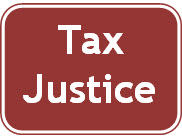
Were he alive today, Jesus would be leading the campaign to crack down on tax-dodging billionaires and multinational corporations according to a really good article in the New Statesman (hat tip: TJN).
I agree.
And I’m not alone. This hymn was sung at the C of E church I attend last Sunday:
1. Inspired by love and anger, disturbed by need and pain,
Informed of God's own bias we ask him once again:
"How long must some folk suffer? How long can few folk mind?
How long dare vain self interest turn prayer and pity blind?"2. From those forever victims of heartless human greed,
Their cruel plight composes a litany of need:
"Where are the fruits of justice? Where are the signs of peace?
When is the day when prisoners and dreams find their release?"3. From those forever shackled to what their wealth can buy,
The fear of lost advantage provokes the bitter cry,
"Don't query our position! Don't criticise our wealth!
Don't mention those exploited by politics and stealth!"4. To God, who through the prophets proclaimed a different age,
We offer earth's indifference, its agony and rage:
"When will the wronged be righted? When will the kingdom come?
When will the world be generous to all instead of some?"5. God asks, "Who will go for me? Who will extend my reach?
And who, when few will listen, will prophecy and preach?
And who, when few bid welcome, will offer all they know?
And who, when few dare follow, will walk the road I show?"6. Amused in someone's kitchen, asleep in someone's boat,
Attuned to what the ancients exposed, proclaimed and wrote,
A saviour without safety, a tradesman without tools
Has come to tip the balance with fishermen and fools.
The hymn is by John Bell (a regular on Radio 4 Thought for the Day) — and I hope he’ll forgive my breach of his copyright — but it seems to me that this is a classic Christian message, bang on the nail — and a theme for those in UK Uncut who need the courage of faith.
Thanks for reading this post.
You can share this post on social media of your choice by clicking these icons:
You can subscribe to this blog's daily email here.
And if you would like to support this blog you can, here:



Zacchaeus the tax collector whom Jesus showed kindness to repented his ways. Tax collectors were, rightly, reviled in his time. Zacchaeus abandoned tax collecting, repaid what he had cheated from people and according to some authorities becoming the first bishop of Caesarea.
The apostles reviled tax collectors as corrupt traitors who oppressed the people of Israel. Jesus hated the sin (collecting taxes for oppressors) but not sinner.
@Guido Fawkes
Ah, but you forget a key issue.
Tax collection had been privatised at the time
It was the corruption inherent in the privatisation process that was hated and which gave rise to the cheating
You see, Jesus was anti-privatisation of what should have been public services too 🙂 (but only half smiling – because I know this can’t be prove – but I suspect it’s true – he hated the process, not he tax in other words).
And re paying tax to Rome – see Paul in Romans 13.6 – where he made clear tax should be paid
Your augment on proper Christian attitudes to tax does not stack
A more scientific than spiritual approach to how you should meet your neighbour has been used by the Italian economist Richiardi in his 2005 paper “Jesus vs Hillel, Moral and Social Norms in Heterogeneous Populations” where he models the outcome of a society where some live by the J-rule and some by the H-rule. You will find it here http://www.religionomics.com/old/erel/S5-ASREC/REC06_Papers/Richiardi_JesusvsHillelMoralandSocialNormsinHeterogeneousPopulations1004.pdf
You’re going to open up a can of worms bringing religion into your arguments. What next? Using Jesus, Buddha or Mohammed as examples to support your views or theories?
Personally, I abhor organised religion and strongly feel that it is one of the main causes of the world’s problems.
@John Buckles
I respect your right to differ!
@Guido Fawkes
Taxes (legally and legitimately sanctioned) are not a sin and you cheapen the notion of sin by claiming they are. Corruption (in this specific case cheating – i.e. levying illegitmate taxes) and oppression (in this case, as in many others – then and now – a mechanism that facilitates corruption) are.
I had an argument with an American Tax official who said that paying tax was a duty to God. He justified it with the “Render unto Caesar …” quote. If you want to see how many interpretations can come from just one line of text have a look here and take your pick!
http://en.wikipedia.org/wiki/Render_unto_Caesar%E2%80%A6